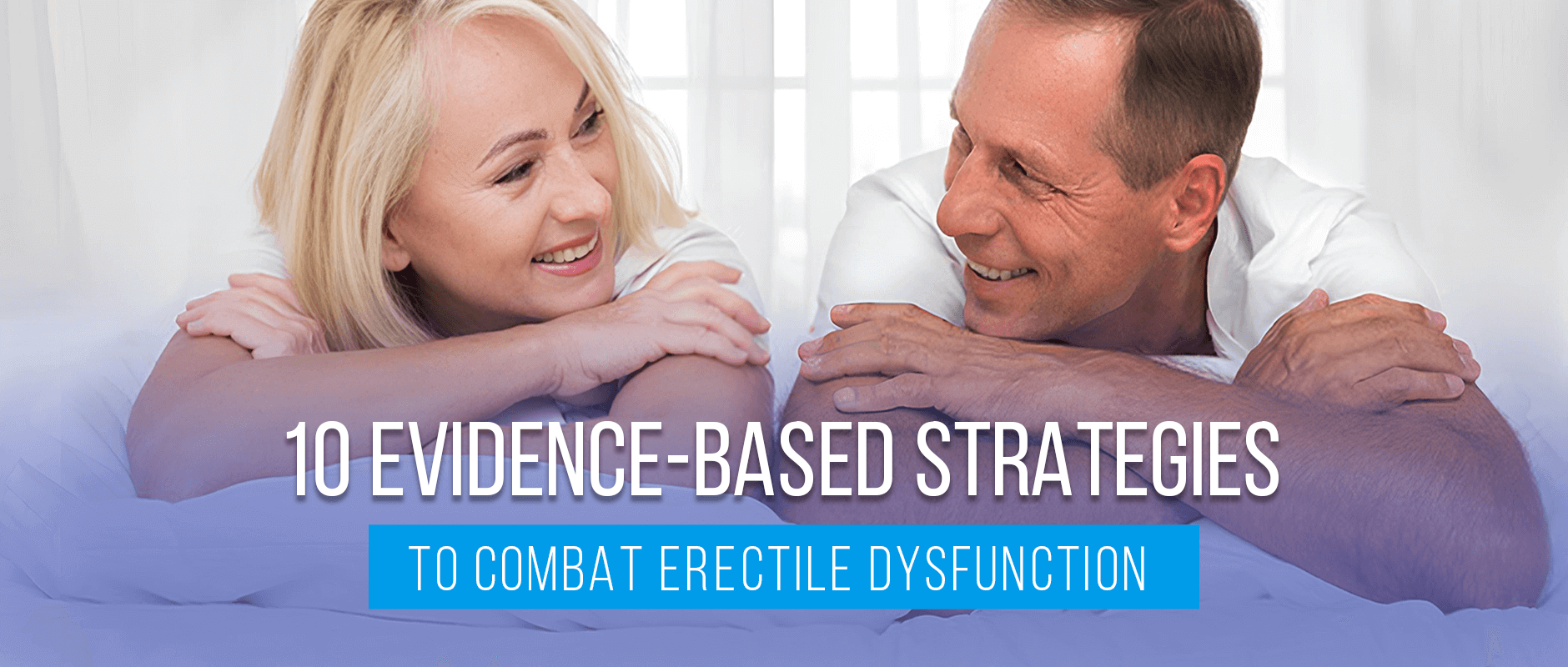 The ability to achieve an erection and perform sexually are critical markers of male health. Yet many fail to recognize erectile dysfunction as a fundamental health issue, attributing ED to personal failure on some existential level. While there are psycho-social factors that play into male sexual performance, shifting focus to improving your overall health can help you boost testosterone, restore your male libido, and overcome ED.
The ability to achieve an erection and perform sexually are critical markers of male health. Yet many fail to recognize erectile dysfunction as a fundamental health issue, attributing ED to personal failure on some existential level. While there are psycho-social factors that play into male sexual performance, shifting focus to improving your overall health can help you boost testosterone, restore your male libido, and overcome ED.
Thankfully, scientists have identified multiple health-related factors that contribute to erectile dysfunction, and all of them are easy to fix.
Erectile Functional Mechanisms of Action
Achieving and maintaining an erection involves a complex interplay of the nervous, vascular and endocrine systems, and all of them need to function optimally during sexual intercourse.
From a physiological perspective, here’s how it works:
- A stimulus, either psychological or physical, activates the parasympathetic nervous system, triggering the release of nitric oxide (NO) from endothelial cells in the penis. Testosterone plays a key role in maintaining libido and regulating nitric oxide production.
- NO prompts relaxation of smooth muscle cells of the penile arteries and trabeculae of the corpora cavernosa (erectile tissue) by activating the enzyme guanylate cyclase, allowing for increased blood flow to the penis.
- Blood fills the cavernous sinuses, expanding the erectile tissue and compressing the veins to prevent blood from returning to the heart, trapping blood in the penis and causing high intracavernosal pressure that makes the penis rigid.
- After ejaculation, or when no longer stimulated, the sympathetic nervous system releases norepinephrine, causing smooth muscle contraction that relieves pressure on the veins, restoring venous blood flow and returning the penis to a flaccid state.

Erectile dysfunction can arise from damage to or suppressed function of neural, hormonal, or vascular factors, or from psychological factors that inhibit arousal signals from the brain. In the vast majority of cases, optimal function can be restored by adopting healthy lifestyle practices and leveraging the benefits of testosterone therapy.
10 Simple Strategies to Boost Testosterone and Combat Erectile Dysfunction
The first step to overcoming erectile dysfunction is to de-stigmatize it as a personal failure, and approach it as a lifestyle-related health issue. By taking action to optimize your health, you will reap a broad spectrum of benefits, not only for sexual performance, but for cognitive function, physical fitness and overall wellbeing.
1. Hit the gym!
The link between lean muscle mass, cardiovascular fitness and erectile dysfunction is well established, and being overweight and/or out of shape can be a key driver of ED.
Higher muscle mass directly correlates with multiple factors that affect ED:
- Exercise increases blood volume, improves circulation, and boosts NO production, all of which influence the ability to get an erection.
- Building muscle boosts testosterone levels, the primary hormone that supports erectile function.
- Increased muscle mass improves insulin sensitivity and helps prevent type 2 diabetes, a key contributor to ED..
- Exercise and increased muscle mass ward off systemic inflammation, which directly impacts erectile function.
2. Boost nitric oxide
Nitric oxide (NO) is an important neurotransmitter, produced in your body from the amino acid L-arginine. NO helps to maintain the endothelial lining of blood vessels that enables them to dilate and constrict, to govern blood flow throughout the body. Circulatory conditions like atherosclerosis, hypertension, or endothelial dysfunction can impair blood flow and increase your risk of heart disease. NO plays a key role in relaxing the cavernous corpora smooth muscles of the penis, enabling you to get an erection.
You can boost nitric oxide levels by eating foods rich in nitrates, such as beets, spinach, arugula, kale, and celery that convert to NO in the body. L-citruline is another amino acid that your body converts to L-arginine. Foods high in L-citruline include pork, poultry, watermelon, cantaloupe, honeydew melon, squash, pumpkin, cucumbers, zucchini, garlic, and onions. Avoid using antiseptic mouthwash – it kills the oral bacteria that convert dietary nitrates to NO.

Hit the gym!
Exercise and lean muscle mass improve circulation, boost nitric oxide, and raise testosterone — all vital for erectile health. Staying fit also reduces inflammation and lowers the risk of diabetes, key contributors to ED.

Boost nitric oxide
Nitric oxide supports healthy blood flow and penile muscle relaxation, essential for erections. Boost levels with nitrate-rich foods and L‑citrulline while avoiding antiseptic mouthwash.
3. Address metabolic health
Metabolic syndrome is a cluster of systemic disorders that dramatically impair total health. Chronic inflammation, hypertension, obesity and type 2 diabetes are all symptoms of metabolic disease. While medical doctors try to control and manage metabolic disorders with drugs – many of which impede erectile function – metabolic symptoms can be reversed and eliminated with lifestyle modifications.
In a 2021 review of studies, researchers found that long-term hyperglycemia from diabetes causes vascular neuropathy, oxidative stress injury, abnormal zinc metabolism, insulin deficiency, and damage to the pituitary gland, gonads, and perigonads, impairing circulation and reducing the secretion of sex hormones. Changes in diet, exercise, sleep and stress management can reverse metabolic syndrome and restore erectile function.
4. Limit substance use
Substances like alcohol, marijuana, and prescription medications can profoundly affect your sexual function, and cigarette smoking has been identified as an independent risk factor for erectile dysfunction. While many men use weed and alcohol as social lubricants to temporarily reduce anxiety, they can dramatically impair your ability to achieve and maintain an erection. Many drugs prescribed for managing hypertension, depression and anxiety are known to suppress sexual function,

Address metabolic health
Metabolic syndrome with obesity, diabetes, and hypertension – impairs circulation and sex hormones, fueling ED. Healthy diet, exercise, sleep, and stress control can reverse symptoms and restore erectile function.

Limit substance use
Alcohol, marijuana, smoking, and some medications impair sexual function and increase ED risk. Though they may ease anxiety, these substances often make achieving and maintaining erections more difficult.
5. Clean up your diet
The standard American diet (SAD) is deficient in nutrients and full of sugar and artificial chemical substances that have been linked to a broad range of metabolic disorders. One recent study found that a low-carb organic Mediterranean diet increases testosterone levels and reduces sperm DNA fragmentation, both important markers for male reproductive health. Start by cutting out sugar, artificial sweeteners, and fried and processed foods. Instead, choose organic fruits and vegetables, and pasture-raised animal products like eggs, beef, chicken, dairy, and wild-caught fish.
6. Stay Hydrated
An erection relies on pressurized blood, and healthy men’s blood is about 60% water. All your body’s systems need blood to function, but your body prioritizes vital organ and brain function over sexual performance. Chronic dehydration lowers your total blood volume, making it a key driver of ED. Strive to drink at least one ounce of water per kg of body weight daily.

Clean up your diet
The standard American diet, high in sugar and chemicals, fuels metabolic disorders and ED. A low-carb Mediterranean-style diet with organic produce and pasture-raised proteins boosts testosterone and supports reproductive health.

Stay Hydrated
Dehydration lowers blood volume and reduces erectile function. Drink about one ounce of water per kg daily to support healthy circulation.
7. Prioritize sleep quality
Quality sleep is essential for physical and mental health, and sleep deprivation is strongly associated with reduced sexual performance. Factors like shift work, chronic stress, and irregular sleep habits have been identified as chief contributors to erectile dysfunction. A 2024 study of rat models found that sleep deprivation severely impairs erectile function. Poor sleep also lowers testosterone levels, which are at their highest during REM sleep. Commit to a consistent habit of going to bed at the same time each day, in a cool, dark room, and strive for 7-9 hours of sleep per night.
8. Nix the Porn
The internet has made pornography available 24/7/365, and males of all ages are becoming addicted. But chronic exposure to porn comes with a price – impaired ability to perform sexually in real life. A team of researchers surveyed 3419 men aged 18-35 to analyze their consumption of pornography, and whether it impacted their real-life sexual performance. They concluded that problematic online pornography consumption resulted in a higher probability of erectile dysfunction, with over 20% of young males reporting some degree of ED.

Prioritize sleep quality
Poor sleep lowers testosterone and impairs erectile function. Aim for 7–9 hours nightly in a cool, dark room with consistent sleep habits.

Nix the Porn
Excessive porn use impairs real-life sexual performance. Studies show over 20% of young men report ED linked to problematic consumption.
9. Manage Stress
Chronic stress is a significant risk factor for ED. Stress, anxiety, and depression can inhibit arousal signals from the brain, and stress triggers the release of cortisol, which can disrupt testosterone production, reduce libido, and impair blood flow. Managing stress through lifestyle changes can help to improve sexual performance. Meditation, breathwork, spending time in nature, and recreational activities can all help to lower stress levels and improve sexual performance.
10. Consider Testosterone Infusion Therapy
Adequate testosterone levels are essential for libido and NO production. A July 2025 report published in Physician’s Weekly cited a positive correlation between erectile function and muscle health, noting that therapies simultaneously targeting muscle health and sexual function, such as supplementing with testosterone and L-carnitine – an NO precursor – can help improve sexual function. Testosterone and amino acids delivered by IV infusion can rapidly raise testosterone levels and boost reproductive health.

Manage Stress
Chronic stress raises cortisol, lowers testosterone, and impairs arousal and blood flow. Managing stress with meditation, breathwork, and time in nature can improve sexual performance.

Testosterone Infusion Therapy
Testosterone supports libido, NO production, and muscle health all key for erectile function. Therapies with testosterone and L‑carnitine, including IV infusions, can rapidly improve sexual and reproductive health.
Boost Testosterone and Fight Erectile Dysfunction with Invita Wellness NYC
Erectile dysfunction is a serious male health issue, and a growing concern among young men in their reproductive prime. Lifestyle factors are the key drivers of ED, and making positive lifestyle changes can dramatically improve your sexual performance. In addition to eating foods that support reproductive health, supplementing with testosterone and amino acids can give your body the tools it needs to get and maintain an erection.
When delivered by intramuscular (IM) injection, testosterone gradually enters your bloodstream and supports muscle growth, fat reduction, and improved insulin sensitivity in the cells. For safe and effective testosterone intramuscular therapy in NYC, contact Invita Wellness, and take control of your reproductive health so you can enjoy intimacy with confidence.
Fight Erectile Dysfunction with Invita Wellness NYC
contact InVita Wellness today
Book Now
456 Broadway 2 Floor, New York, NY 10013, USA
Resources
Corsetti, Veronica, Tiziana Notari, and Luigi Montano. “Effects of the low-carb organic Mediterranean diet on testosterone levels and sperm DNA fragmentation.” Current Research in Food Science 7 (2023): 100636.
https://www.sciencedirect.com/science/article/pii/S2665927123002046
He, Zubin, et al. “Diabetes mellitus causes male reproductive dysfunction: A review of the evidence and mechanisms.” In vivo 35.5 (2021): 2503-2511.
https://iv.iiarjournals.org/content/35/5/2503.abstract
Jacobs, Tim, et al. “Associations between online pornography consumption and sexual dysfunction in young men: multivariate analysis based on an international web-based survey.” JMIR public health and surveillance 7.10 (2021): e32542.
https://pmc.ncbi.nlm.nih.gov/articles/PMC8569536/
Melis, Maria Rosaria, and Antonio Argiolas. “Erectile function and sexual behavior: A review of the role of nitric oxide in the central nervous system.” Biomolecules 11.12 (2021): 1866.
Erectile function and sexual behavior: A review of the role of nitric oxide in the central nervous system
Ostfeld, Robert J., et al. “Vasculogenic erectile dysfunction: the impact of diet and lifestyle.” The American Journal of Medicine 134.3 (2021): 310-316.
https://www.sciencedirect.com/science/article/abs/pii/S0002934320309189